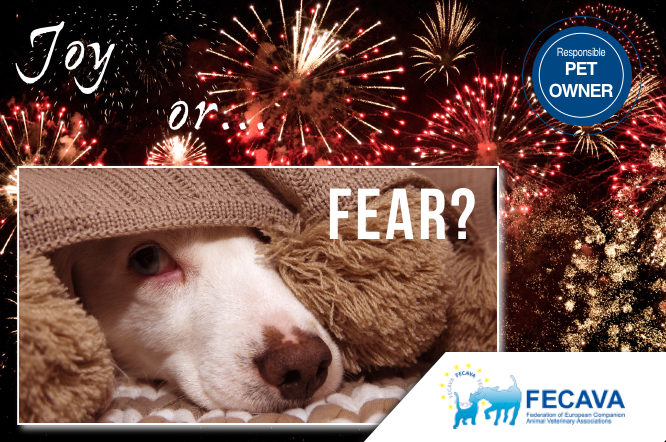
Advise for pet owners on measures to keep their pets safe during fireworks season
Most pets are scared by sudden, loud noises and the end of December can be a very distressing time.
Up to 80% of pet owners report that their pet is afraid of fireworks. Most pets will display mild symptoms of fear or anxiety initially but if improperly managed they tend to get worse.
Some of these animals will suffer from noise phobias – their reaction to certain noises are sudden, extreme and excessive. This can be very distressing for pets as well as their owners and can result in harm to the pet – for example, dogs may panic and run blindly. The end of December is a common time of year for pets to go missing or to be injured on the roads.
Some signs of anxiety to look out for in pets:
Dogs
- Shivering or shaking
- Destructive behaviour – e.g. chewing/scratching
- Soiling the house
- Panting excessively
- Licking lips
- Pacing
- Attempting to run away
Cats
- Cowering or hiding
- House soiling
- Refusing to eat
- Attempting to run away
Advice to pet owners during Festive days:
- Ideally, try and ensure that someone remains with your pet when fireworks will be heard, and especially on the night of New Year.
- Provide a den or a hiding place where your pet can feel safe. Make your pet a comfortable bed here, with old sweatshirts and other clothing to give your pet a sense of your reassuring presence. A crate with some blankets over it is ideal for a dog. A cat may prefer to hide in a high up location such as the top of a wardrobe.
- Keep your pet inside with the doors and windows closed and your favourite radio station switched on in the room. Provide an extra litter tray for cats.
- Make sure to exercise your dog early in the day, and give your pet something to do in the evening (such as chewing a frozen food-stuffed dog toy).
- Ensure that all pets are wearing identification tags and have microchip identification.
- Do not punish your pet for anxious behaviour such as scratching at doors or house soiling. This can also tend to exacerbate anxiety and make matters worse.
- There are plug in diffusers, sprays and collars containing pheromones, as well as other products available from your vet, all of which can help to relieve anxiety in pets.
- In severe cases visit your vet who may be able to prescribe medication to help in the short term.
- In the long term, these pet owners need to ask their vet or a qualified behaviourist about noise desensitisation to prevent worsening of the problem.
Advise is provided by Veterinary Ireland
Leave a reply

Leave a reply